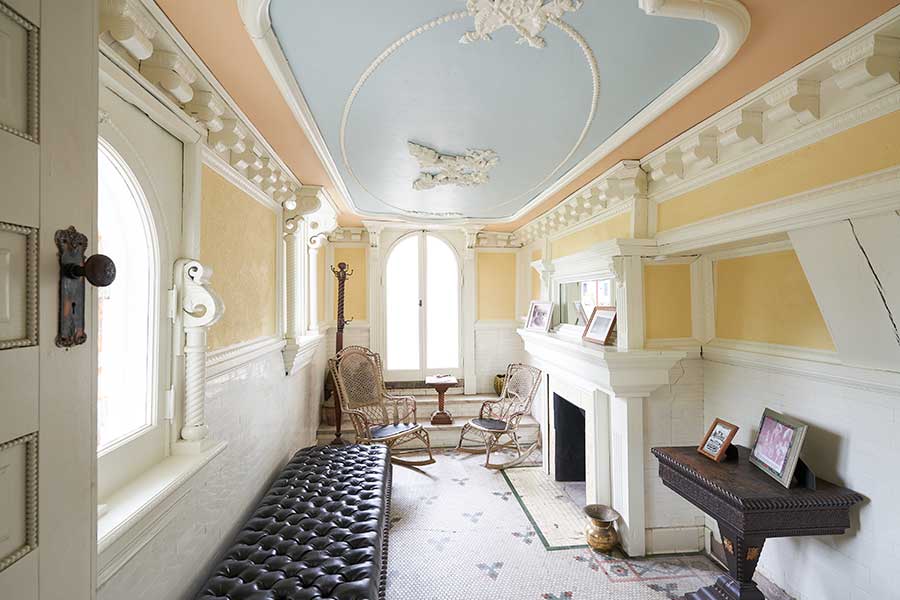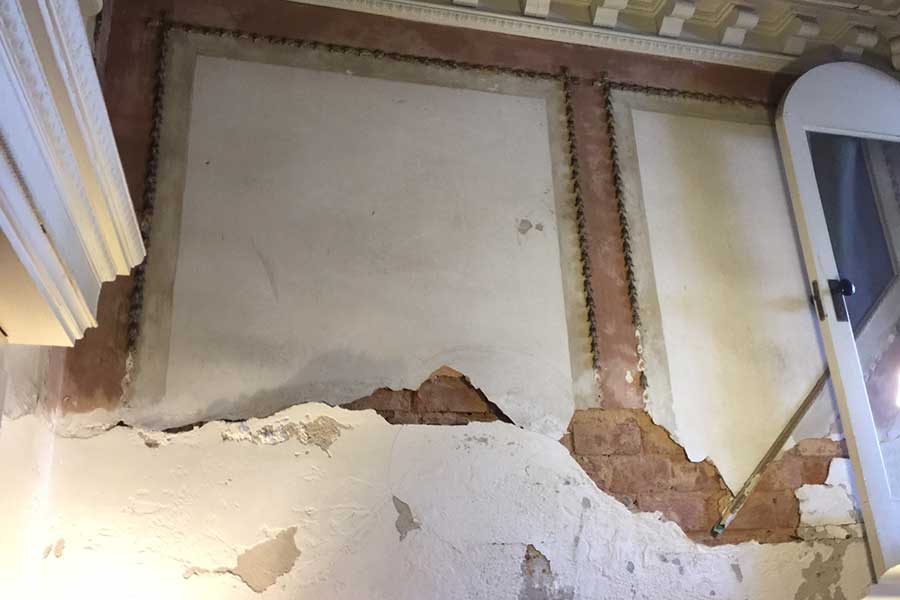Restoration and Preservation

Restoration & Preservation
After the Jule Körner’s death in 1924, and Polly Alice’s passing in 1934, Körner’s Folly was never again lived in as a full-time family home. Their descendants tried a variety of ways to manage the home’s upkeep, but the structure’s vulnerability to weather and time was enormous. In the late 1920s, just prior to the Great Depression, they opened it up for tours. Later, it was rented to the proprietor of an antique shop, and to an architect for use as his office and residence.
Despite these multiple repurposes, by the late 1960s, this remarkable home sat vacant and in serious danger of vandalism and deterioration to the point of collapse. The Kernersville community grew increasingly concerned about the home’s stability. In 1970, 26 local families came together to save the home for the education and enjoyment of the public. They purchased Körner’s Folly, saving it from demolition, and became the house’s caretakers for the next 25 years. Those families lead tours, raised money for much needed repairs, and hosted community events. They succeeded in having Körner’s Folly listed on the National Register of Historic Places in 1972.
In 1995, with assistance from Preservation North Carolina, they dissolved their ownership in order to form the Körner’s Folly Foundation, a 501(c)(3) non-profit organization led by a volunteer Board of Directors. This non-profit designation placed restrictive covenants on the property’s use, protecting it in perpetuity from demolition or inauthentic renovation. It also placed the home in the public trust, to exist for education, not for the profit of any owner. Establishing this type of organization also allowed the Körner’s Folly Foundation to accept tax-deductible gifts from individuals and businesses, as well as to pursue grants from private and governmental organizations.
Our goal is to restore the house to the 1890-1915 appearance. As an interior designer, Jule was constantly experimenting with new colors, wall papers, tiles, and finishes. This 25-year period of interpretation allows us to show how the house changed dramatically over time.
Restoration is the process of depicting the form, features, and character of a property at a particular period of time. The interior restoration process includes removing modern elements added over time, replicating and repairing missing or damaged woodwork and tile, refinishing and cleaning the architectural surfaces, and returning the rooms to their original color schemes.
There were two major periods of renovation that are well documented at Körner’s Folly. The first was in the early 1890s after Jule married his wife and they started having children, when they renovated the home to accommodate the growing family. The second was from 1903-1908, when Jule reportedly spent $17,000 to renovate the house (over $400,000 in today’s dollars) after his children left home for school. These renovations were unveiled in a huge graduation party in 1908 when his daughter graduated from Salem College and his son graduated from Trinity College (later known as Duke University).
You have a special opportunity to experience the renovation and preservation of Körner’s Folly in person, as the house museum will remain open during this process. Call ahead or visit our website for the latest news and information regarding restoration projects.
Rooms Restored to Date:
- Rose Room
- Blue Room
- Cupid’s Park Theatre
- Main Kitchen
- Sitting Room
- Smoking Room
- Cellar
- Den
- Breakfast Room
- Master Bedroom
- North Entryway and Staircase
- Children’s Playrooms (2)
- Summer Kitchen
- Library
Rooms in Need of Restoration:
- Dining Room
- Long Room
- Reception Room
- Dressing and Bathing Rooms
Rooms in Progress:
- Foyer
How You Can Help
The continued interior restoration cannot happen without generous financial support. If you would like to be a part of this critical effort, please contact us at 336-996-7922 for information about tax-deductible donation opportunities. Or visit our donate page to make a donation today!
If you are interested in starting your own historic preservation project, we recommend reaching out to the following organizations:
- Forsyth County Historic Resources Commission
- Preservation Forsyth
- State Historic Preservation Office
- Preservation North Carolina
































